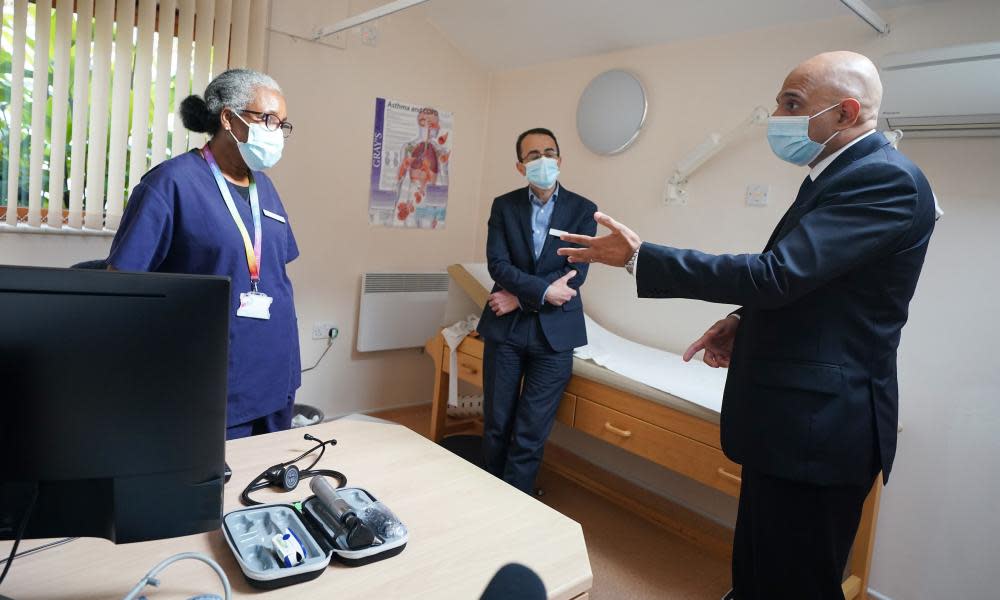‘It is with a heavy heart that I leave’ – why the unrelieved pressure is pushing GPs to quit

Concern has been growing for years that GPs are burning out, and sometimes dropping out, in the face of increasingly heavy and complex workloads that many have described as being already unsustainable, if not impossible.
In a tweet in September, Dr Laura Mount, a GP in Warrington, offered an insight into just how relentlessly busy family doctors were day in, day out, in a way that few other staff in the public or private sector experienced.
Mount, who stressed that she “loved seeing patients”, related how in her first hour at work she saw three patients face to face, booked to see another one at 7am the day after, talked to two more patients in person with a trainee doctor present, dealt with 16 queries, 30 prescriptions, 34 emails and five referral letters from hospitals, each containing instructions about what they needed to do – all in 60 minutes. “Nine more hours to go. Also my daughter’s first day at high school,” she added.
Related: GPs’ leader condemns ‘malicious criticism’ by politicians
In May another GP, Dr Danielle Eaton, tweeted about leaving. “I handed my notice in Friday. I am a GP and love the NHS and what it stands for, both patients and professionals. However, primary care is unsustainable currently. It is with a heavy heart that I leave.” She was moving to a job that involved less pressure and a better work/life balance, she said.
Jeremy Hunt, the UK health secretary between 2012 and 2018, said on Thursday that despite success in increasing the number of trainee GPs in England to record levels, the overall number of full-timers continued to drop “because experienced GPs were retiring/going part-time faster than new trainees arrived”.
Official figures collated by NHS Digital show that the number of full-time GPs fell from 29,403 in September 2015 – the month in which Hunt pledged to expand the GP workforce by 5,000 by 2020 – to 28,023 in August this year, a drop of 1,380 at a time when numbers should have been rising.
Hunt said, in effect, that forces beyond his control – how GPs felt about their work, their intense frustration at the growing demands on them and fear that rapid-turnover medicine could lead to mistakes – had wiped out what would otherwise have been laudable progress.
In addition, the 4% rise in England’s population since 2015 means there is now one full-time-equivalent GP for every 2,045 patients, an increase of 182 patients (9.7%) in six years.
The ageing population – the numbers of over-65s have increased 10% in that time – is also adding to the volume and complexity of care GPs are expected to deliver. The 27% of patients who have what doctors call “multi-morbidities” account for 53% of patient consultations.
Those statistics help to explain why, faced with a declining workforce but growing demand for care, GPs often describe general practice as “in crisis” or “on its knees”.
The government has made two key pledges to try to tackle this mismatch of supply and demand: hiring 6,000 extra GPs and, second, by 2024, recruiting 26,000 practice support staff such as pharmacists, physiotherapists, mental health workers and social prescribers, who could see some patients. Few think the first plan will happen but progress towards the second goal is going better, with 8,400 of the promised 26,000 already in place.
Despite that glimmer of hope, this remains a fragile and overburdened workforce, with no prospect that real relief – in the shape of the thousands of extra GPs the profession and ministers agree are needed – is arriving any time soon.
Related: What’s behind Sajid Javid’s row with GPs?
The insistence this week by Sajid Javid, the health secretary, that from now on every patient wanting a face-to-face appointment should get one risks worsening a serious situation by prompting already overworked, disillusioned family doctors to quit.
Hefty pensions and good career earnings make leaving an easy option for those doctors in their 50s. Prof Martin Marshall, head of the Royal College of GPs, who has just turned 60, related at its annual conference on Thursday how many of the GPs he had trained with had already retired.
So while the health secretary may be pleasing backbench MPs and government-friendly newspapers with his tough new approach, there must be a risk that it will prompt even greater numbers of people whose role and dedication is so vital to the smooth functioning of the NHS to quit – and so leave his pledge, for patients’ automatic “see the doctor” right, as just another broken promise on GPs.

 Yahoo News
Yahoo News 
